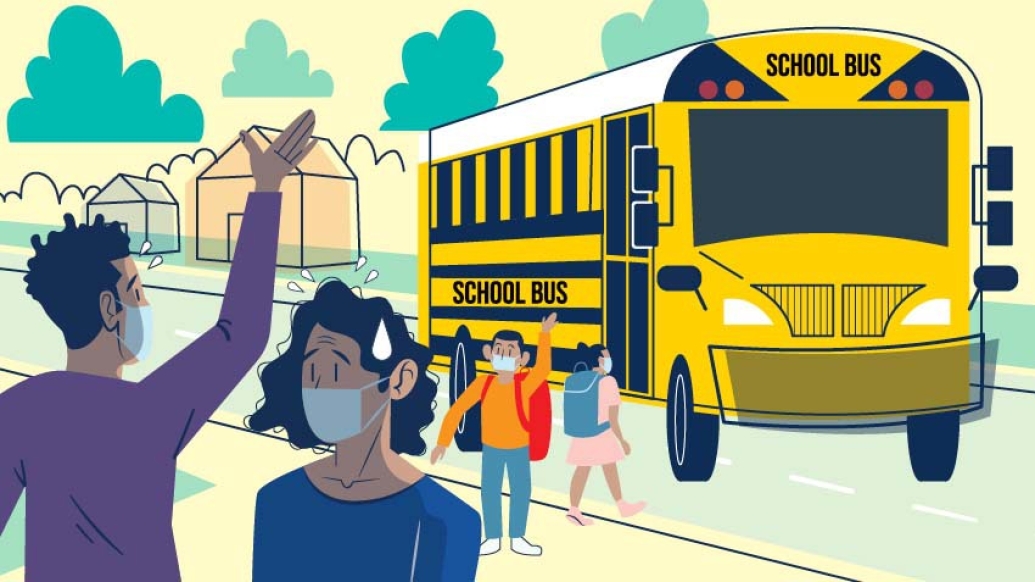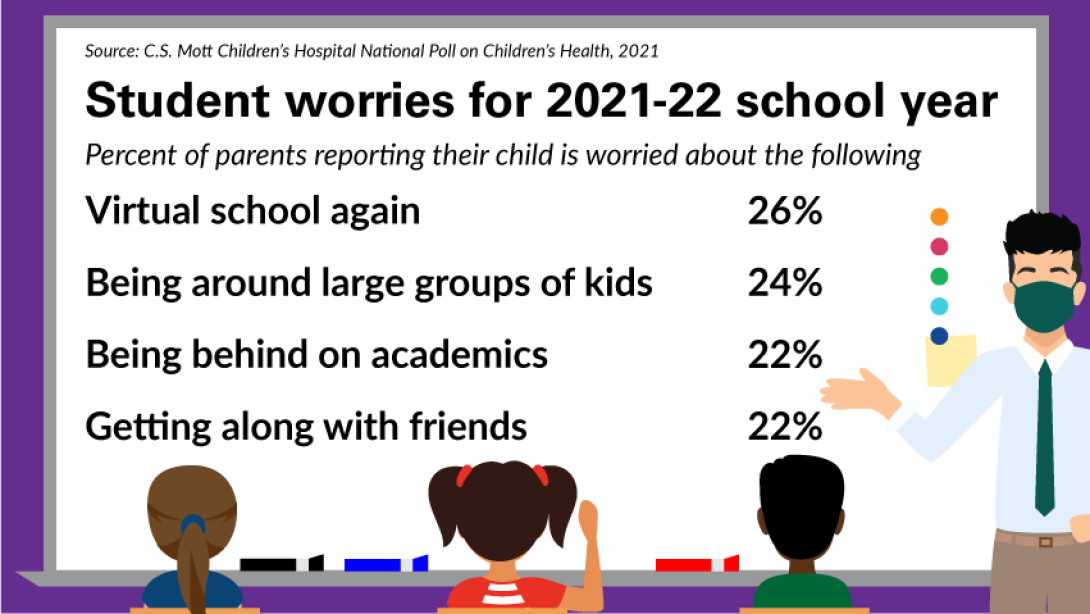Among biggest concerns: A repeat of virtual school, academic gaps, getting along with friends and school vaccination rates.
8:56 AM
Author |

Back to school jitters may have a different meaning in the COVID era.
After more than a year of pandemic disruptions, families are heading into the next school year worried about COVID's looming impact on students, according to the University of Michigan Health C.S. Mott Children's Hospital National Poll on Children's Health.
Top of mind for many: a possible repeat of virtual school, falling behind academically and problems connecting with friends as well as wanting to know vaccination rates among teachers and students to feel safer.
"COVID wreaked havoc on many families' school experience last year, with parents and kids navigating unpredictable changes in the learning environment and new social, emotional and academic challenges," said Mott Poll co-director Sarah Clark, M.P.H.
"Our report suggests that those experiences left a mark on students and families, influencing their views and concerns about the upcoming school year."
The nationally representative Mott Poll report is based on responses from 1,669 parents with at least one child age 7-18.
COVID worries linger into the next school year
For many children and teens, last year's back to school season meant starting a new grade at kitchen tables and meeting classmates and teachers on screens. For others, the school year came with plexiglass dividers in classrooms, eating lunches at desks and facing COVID exposure quarantines.
But these transitions impacted different students in different ways, the poll suggests.
Over half of parents rate at least one aspect of the 2020-2021 school year as worse than the prior year – 25% on academic performance, 36% on connections with teachers, 40% for the impact on relationships with other students and 32% for general attitude.
Like Podcasts? Add the Michigan Medicine News Break on iTunes, Google Podcasts or anywhere you listen to podcasts.
Meanwhile, a third of parents cited at least one area that was better for their child during the pandemic: 24% for school performance, 19% for teacher connections, 14% for peer relationships and 17% for attitudes about school.
Parents whose child had mostly virtual school, however, rated more aspects of the last school year as worse, compared to parents whose child had little virtual school. Twenty-six percent of parents also report their child is worried about having to do virtual school again – a warranted concern as outbreaks stemming from the contagious Delta variant are already prompting some schools to return to virtual formats.
"Establishing a successful virtual learning environment was challenging for many families. This may have been particularly true for those with technical barriers, students with special needs and those whose home environments didn't offer quiet and comfortable spaces to learn," Clark said.
"For some children, the decreased level of interaction with teachers also required more supervision or assistance from parents throughout the school day – which could be especially challenging for those working from home themselves."
Outlooks for the 2021-2022 back to school season
In addition to concerns about returning to virtual learning, parents say their child's worries for the new school year also involve feeling comfortable around larger groups of children (24%), being behind on academics (22%), and getting along with friends (22%).
It's likely that many children may need time and additional support to catch up in some academic areas that they did not fully grasp in the last school year.Sarah Clark, M.P.H.
"It's likely that many children may need time and additional support to catch up in some academic areas that they did not fully grasp in the last school year," Clark said, suggesting parents ask teachers for suggestions on supplementary work.
"Some children and teens who may have avoided social anxieties or conflicts during virtual school may also need support transitioning back to traditional in-person school," she added.
Parents polled noted that the challenges of the 2020-21 school year were more difficult due to increased stress – their own and their child's – as well as uncertainty about how to implement virtual learning.
Still, looking ahead, many feel very confident that they will know how to help their child be successful with school in the upcoming year (51%), bounce back when things don't go well (47%), and deal with peer problems (44%).
Many kids may have positive outlooks as well, with 41% of parents saying their child is more enthusiastic about the 2021-22 school year while 16% are less enthusiastic, and 43% feel about the same.

62% of parents would feel safer with higher school COVID vaccination rates
As COVID cases surge again across parts of the country, about three in five parents of middle- and high-school students also say their child would feel safer if most students and teachers were vaccinated against COVID. And most families want to know how many aren't vaccinated.
But only one in five say this information would affect their decision about having their child attend in-person school.
"Many families would feel safer knowing their school has a high vaccination rate," Clark said.
MORE FROM MICHIGAN: Sign up for our weekly newsletter
"But some may feel that the potential negative impacts of not attending in-person school outweigh risks from unvaccinated individuals. Parents may also believe that they can minimize that risk by having their child get a COVID vaccine."
She suggested parents and students ask questions about their school's COVID mitigation measures, so they know what to expect and how to prepare. Many experts and several organizations, including the Centers of Disease Control and Prevention and the American Academy of Pediatrics recommend universal indoor masking for all teachers, staff, students, and visitors to K-12 schools, as well as other prevention strategies.
"Parents will want to learn about school policies related to masks and social distancing, and then talk with their child about how to navigate the school environment to feel as safe as possible," Clark said.

Explore a variety of healthcare news & stories by visiting the Health Lab home page for more articles.

Department of Communication at Michigan Medicine
Want top health & research news weekly? Sign up for Health Lab’s newsletters today!





